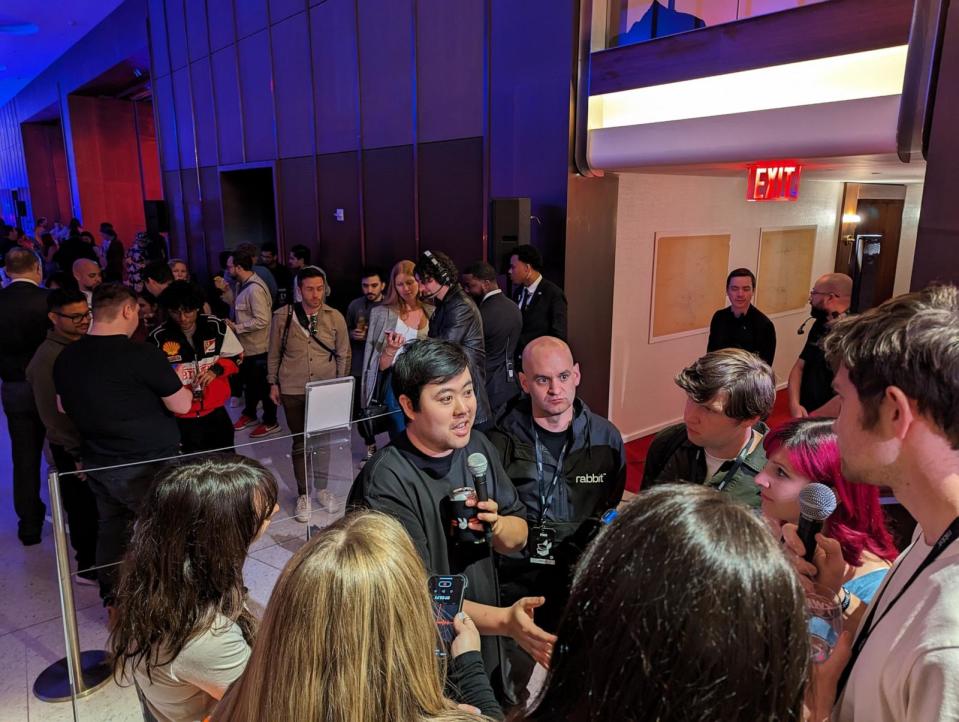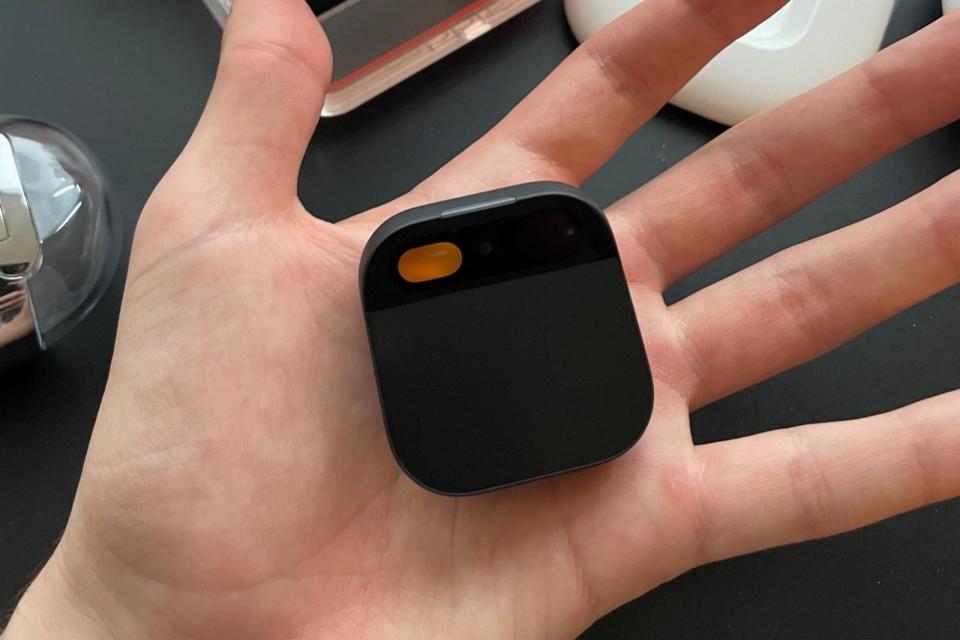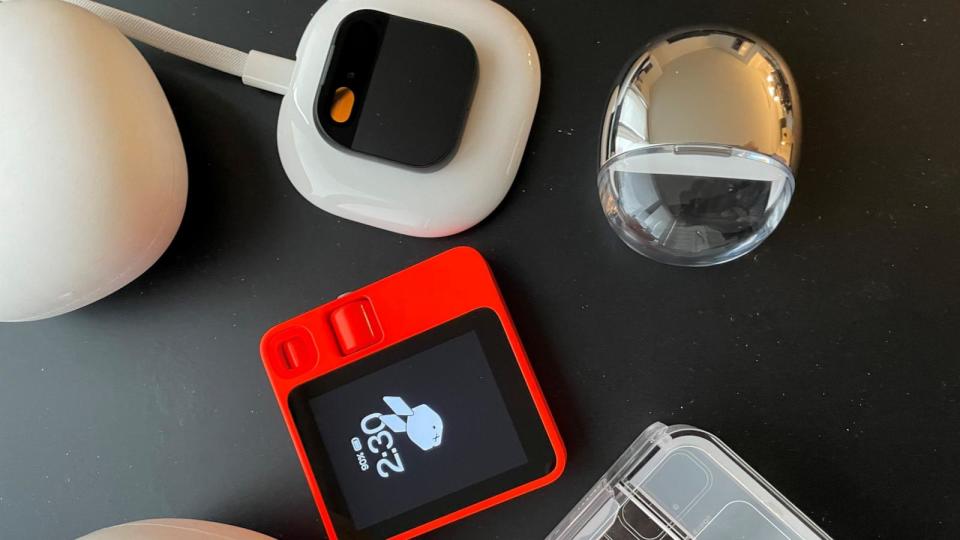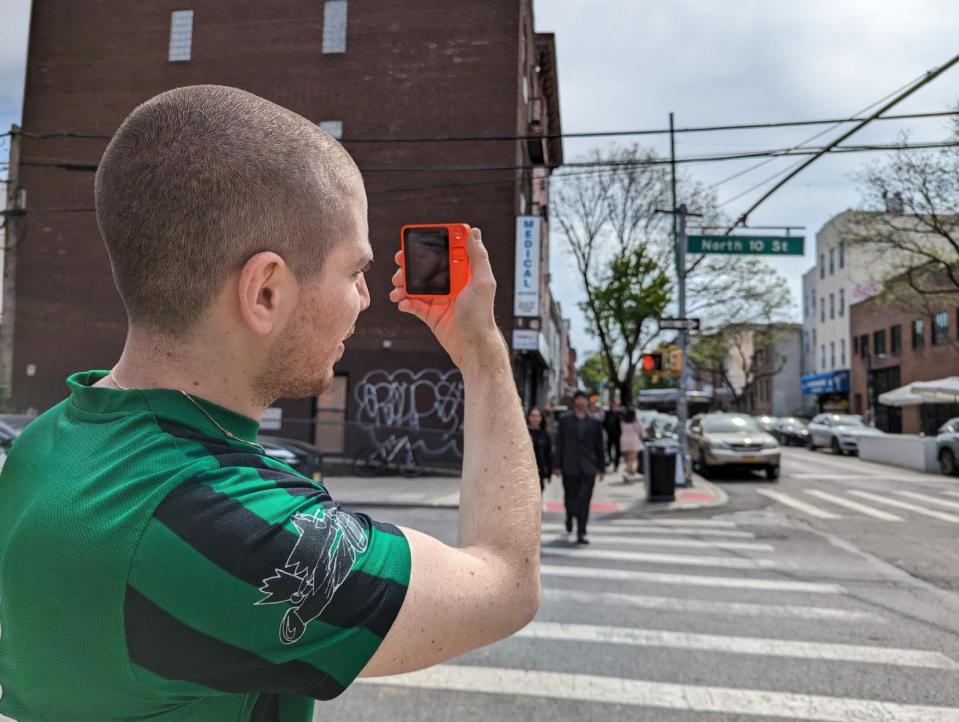If 2023 was the year of AI software, then 2024 will be the year of AI hardware.
In recent months, companies like Google, Samsung, Meta and Microsoft have shown off smartphones and laptops – even glasses – all claiming to heavily integrate generative artificial intelligence. But this moment has also given rise to a new type of device aimed at letting users interact with AI.
At an event at the TWA Hotel in New York City last month, customers took delivery of the very first Rabbit R1s. Bright orange and about the size and shape of a pack of sticky notes, the device has a compact 2.88-inch screen, a camera in the top right corner, a scroll wheel and a button on the side to activate voice control. The idea, according to Rabbit CEO Jesse Lyu, is to reduce the number of steps it takes to do something you currently do on a smartphone.

“Our mission is to make the simplest computer – something so intuitive you don’t have to learn how to use it,” Lyu said during the keynote of the company’s Consumer Electronics Show in January.
Instead of scrolling through pages of apps and notifications while trying not to get distracted by Instagram, Rabbit says users can simply speak a command to the R1. Then, using an artificial intelligence technology they call a ‘Large Action Model’, the device will meet that demand.
At least, that’s the idea.
The early adopters of Rabbit
Daniel Ko is a fractional CFO for AI startups. He says Rabbit isn’t involved in his work at the moment – he’s just a customer for now – but he sees a lot of potential in the R1.
“Personally, I bought it because it looked super cool and is in a way the first generation product of something that might be the next iPhone,” Ko told ABC Audio.
“I guess I’m just curious right now,” says Danny Cole, a New York City artist who also has an R1. He says he likes the idea of a device that keeps people away from smartphones.
MORE: Emerging AI technologies make it easier for bad actors to ‘conceptualize and execute’ chemical, biological, radiological or nuclear attacks: DHS
“I think it’s hard for us to predict whether phones will be the answer to our needs in 10 years or 20 years,” says Cole, adding, “Probably not!”
Jonah Cohn is a college student in Chicago. He told ABC Audio that he came to New York to pick up his R1 in person.
“I would definitely consider myself a serious early adopter,” says Cohn, who also owns a Vision Pro, Apple’s mixed reality headset that went on sale earlier this year. “I’m really someone who likes to try things in the first generation so that I can get a handle on what the rest of our world is going to take over.”


But he also said early adoption is risky — especially when it comes to artificial intelligence, which has been criticized for being unreliable and inaccurate.
“I was afraid that I would get this thing and it wouldn’t do what it says. And I still haven’t figured it out, because you know, even though I just got it, I’ve only had it for five minutes, you know? Cohn said.
The human AI pin
Rabbit isn’t the only tech company making a claim in AI gadgets. Humane, a company founded by several former Apple employees, recently began selling the AI Pin, a $699 wearable device, 1 3/4 inches square and 1/3 inch thick, that attaches to a person’s clothing attached, like a lapel pin.
“The AI Pin is a completely new kind of computer,” Bethany Bongiorno, CEO of Humane, told ABC Audio. She said that despite the price tag – and the $24 monthly phone plan – the Pin is not intended to replace a smartphone.
“When you got a smartphone, it didn’t replace your laptop. But it created a very different relationship with your laptop,” Bongiorno said. “It was much more targeted: you went to your laptop for certain things that it was very good at. You turned to your smartphone for things it was really great at. And we think the PIN allows you to have a more focused relationship with your phone.”
MORE: Disputes over the threat of extinction due to artificial intelligence loom over the growing industry
According to Humane, a phone is for things like watching videos and scrolling social media. The AI Pin, meanwhile, is meant to perform tasks like sending messages, setting reminders, and looking things up. The Pin’s answers, like those of the Rabbit, are read out by an automated voice. Those answers are generated by a combination of large language models – that is, artificial intelligence technology that can understand and generate human language – from companies like OpenAI and Google. Bongiorno said it’s all in an effort to prevent users from getting sucked into their phones.
“I prefer to use my PIN at more times during the day because I choose to want to stay present,” she said. “Personally, I want to be able to live my life in the world with my family and my friends, and I want to try to use my phone less.”
However, reviews of the AI Pin have been overwhelmingly negative so far.
The pin is panned
Tech reviewer Marques Brownlee, who goes by “MKBHD” on YouTube, called his review of Humane’s device “The worst product I’ve ever reviewed… for now.” A review from tech publication The Verge notes that “the AI Pin isn’t worth the money.”
Engadget Deputy Reviews Editor Cherlynn Low told ABC Audio that the device “doesn’t solve any real problem” and “doesn’t know how to be good.”
“There was a big backlash when the Humane AI Pin reviews came out, where many reviews were negative, including mine,” says Julian Chokkattu, editor of Wired Reviews.
He said his complaints about the Pin covered everything from its limited features to its unreliable AI-generated responses. Several reviewers said the AI Pin took too long to respond to questions, meaning they often returned to their smartphones for answers. Others experienced overheating issues that made the AI Pin uncomfortable to wear.
Humane responded that many of these issues are being addressed in software updates, which will make this possible [the] Ai Pin will become smarter and more powerful over time.” The company added that they will continue to make improvements.
In a statement, the company told ABC News that the AI Pin represents “just the first page of the first chapter of an entirely new product category.”
MORE: Elon Musk releases code for his AI chatbot Grok. This is why it matters
However, Chokkattu said buyers should hold off on purchasing devices that are incomplete: “My request would be that they only ship finished products, but unfortunately we don’t live in that world anymore.” In the meantime, he said, most people already have a device that does everything the AI gadgets are trying to do.
“Personally, I don’t think any of these devices coming to market are even close to dethroning like the smartphone,” Chokkattu said.
AI gadgets in the real world
Not everyone has had a disappointing experience with these early AI gadgets. Jonah Cohn, the Rabbit R1 early adopter from Chicago, also has a Humane AI Pin. He says it has proven useful, such as when he recently came across a group of people dressed up in costumes in a park.


“I saw some people cosplaying in Star Wars outfits, and I thought, ‘Hey, why are people cosplaying in Star Wars outfits in Chicago these days? Is there something going on?’ And within a few seconds he was able to tell me there was a conference going on down the street,” Cohn said. “That was pretty cool. I didn’t have to take out my phone, I didn’t have to disconnect from the social interaction I was in. I just asked really quickly.
Still, Cohn said that aside from the device’s technical capabilities, the Pin has presented some social challenges, such as the first time he wore it in the grocery store.
“I was a little embarrassed when I got to the checkout, and I quickly took it off my shirt,” he said. ‘Because I know it’s not a recording, but the man at the cash register, who I know a little bit, doesn’t know that. And I don’t really want to put him through that awkward situation of, “Is this guy recording me?”
About a week after the Rabbit event, Danny Cole tested his new R1 at McCarren Park in Brooklyn, New York. When prompted, the device accurately answered questions like “what’s the weather like right now?” and “who was the president in 1955?”
Additionally, the R1 was also able to identify a number of things in the area using its camera system, saying things like “these appear to be pigeons” and “this is a Jeep Wrangler.”
MORE: Jon Bon Jovi, Billie Eilish and more sign open letter protesting ‘predatory use of AI’
But Cole admits the device is far from perfect.
“There was a song that I had in my head, and there were certain lyrics that I remembered very clearly. And I was like, ‘oh, I bet I can ask the Rabbit what song this is,'” Cole told ABC Audio. “I asked the Rabbit, and it gave me a different song. And I tried again and again and again, but the song just wasn’t right.”
After owning it for a week, Cole said he was disappointed with his purchase. The R1 lacks features it expected to be there, and its reliance on AI for its responses means it can be inaccurate.


“It’s sad to say, but it doesn’t really work reliably yet,” says Cole.
Rabbit told ABC News that “the accuracy and detail of [the R1’s responses] is based solely on” the major language models it uses. Rabbit has also started sending out software updates to fix some issues.
But for now, Cole’s smartphone isn’t going anywhere.
“It’s really fun to show people – look at it if it works,” he said of the Rabbit R1. “But it only makes sense if you can trust that it works.”
Listen to the full story from ABC Audio:
AI gadgets are here, but are they any good? originally appeared on abcnews.go.com